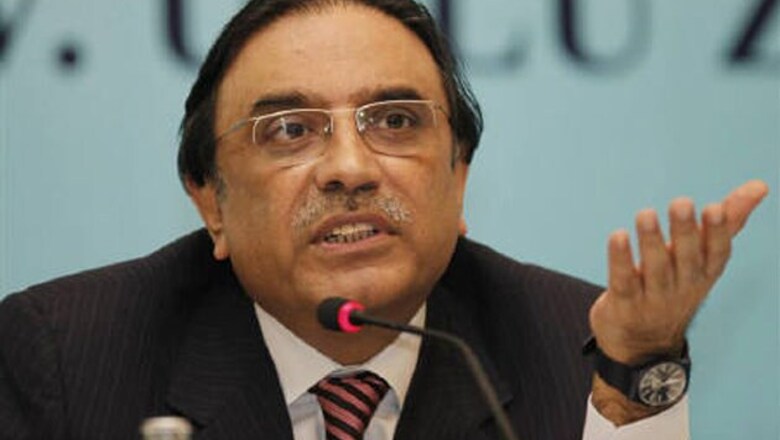
views
Islamabad: Pakistan President Asif Ali Zardari on Wednesday raked up the execution of Parliament attack convict Afzal Guru in his address to the joint session of the legislature of Pakistan Occupied Kashmir (PoK). He also threatened that Pakistan will continue to highlight the Kashmir "cause" at international forums.
"The hanging of Afzal Guru through the abuse of judicial process has further aggravated and angered the people of Kashmir," he said. He claimed recent protests in Jammu and Kashmir had forced international human rights organisations, journalists and intellectuals to take notice of the issue.
"The situation has alarmed many within India. Saner voices have urged the Indian government to give up the path of violence," he said. The Pakistan government will continue to highlight the Kashmir "cause" at international forums, including the UN and OIC, he said.
"We believe that any resolution of the Kashmir issue must be centred on the Kashmiris themselves. They alone must be the principal beneficiaries. For a durable resolution, Kashmiris must be associated with the dialogue process," he said.
Zardari also said Pakistan and India should not allow terrorists and militants to dictate the agenda as engagement and dialogue alone can settle long-standing issues like the Kashmir dispute and create peace in South Asia. "We believe that Pakistan and India should not allow terrorists and militants to dictate the agenda. The drive for peace, security and stability in South Asia must not be held hostage to the designs of the militants," Zardari said in his address to a joint session of the assembly and council of PoK.
"Pakistan firmly believes that dialogue is the only way forward. We have always emphasised engagement and dialogue," Zardari told the session held in the PoK capital of Muzaffarabad. The Kashmir issue, he said, is an "important segment" of the composite dialogue with India.
Zardari contended that Kashmir held the "key to peace and progress in South Asia, home to one-fifth of humanity". He said Pakistan "wants and needs peace" with all its neighbours and the resolution of the Kashmir issue would pave the way to normalise relations between Pakistan and India.
Stating that Pakistan had been affected more by terrorism than any other country", he said Islamabad was keen to deal with the menace "at all planes". He added, "We believe that counter-terrorism requires practical cooperation. We cannot fight terrorism through blame game and hostile propaganda".
Relations between India and Pakistan hit a low earlier in 2013 after a string of violations of the ceasefire along the Line of Control in Kashmir. The 742-km LoC witnessed several clashes that marked the worst violations of the truce that was put in place in late 2003. Both sides traded angry charges over the incidents before the Directors General of Military Operations agreed on steps to de-escalate the situation.
The tension along the LoC had an impact on bilateral relations and led to the cancellation of several planned bilateral meetings. However, Zardari noted that several Kashmir related confidence-building measures had held despite "ups and downs" in the composite dialogue between the two countries.
The Kashmir-related CBMs, including border crossings, bus services and trade across the LoC, are aimed at reducing the suffering of Kashmiris. "The aim was to create a conducive environment for the settlement of the long-standing dispute. I am happy to note that despite ups and downs in the composite dialogue process, the CBMs have held," he said.
At the same time, Zardari reiterated Pakistan's long-standing position of extending "strong moral, political and diplomatic support" to the Kashmiris in their movement for the right of self-determination. "Force and oppression has been used against them but the voice could not be silenced. It will never be," he claimed.


















Comments
0 comment